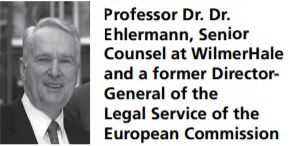 The Court of Justice of the European Union (“CJEU”) delivered on 4 February 2016 its judgement on the Ince case (C-336/14), a preliminary ruling referred by the local court of Sonthofen in the German Land Bavaria. The case is of interest for cross-border gambling operators as it rules against the enforcement of national legislation found to be contrary to EU Law by national courts.
The Court of Justice of the European Union (“CJEU”) delivered on 4 February 2016 its judgement on the Ince case (C-336/14), a preliminary ruling referred by the local court of Sonthofen in the German Land Bavaria. The case is of interest for cross-border gambling operators as it rules against the enforcement of national legislation found to be contrary to EU Law by national courts.
On 8 September 2010, the CJEU held that the version of the State Treaty on Gambling that had been in force since 1 January 2008 violated Article 56 TFEU because the State monopoly rules in that treaty were inconsistent by not covering certain types of games (e.g. automated games) that posed higher addiction risks than certain types of games (e.g. sports bets) that they did cover.1 On 1 July 2012, a revised version of the State Treaty on Gambling entered into force in Bavaria (except Schleswig-Holstein), which provides for the award of 20 licenses to private operators. However, due to numerous legal challenges, the Land of Hesse, which is in charge of the award of the licenses on behalf of all Länder, has not awarded any licenses to date, and as the award procedure has recently been declared illegal under German law by the competent court of last instance2 , it must be considered to have finally failed.3
“It is now for the European Commission, who generously gave Germany two years to implement the “experimental clause”, to take decisive action in such cases of blatant disregard of EU law jurisprudence and start a long-overdue infringement procedure against Germany.”
As to the facts of the case and in this context, Ms. Ince faced criminal charges for acting as an intermediary for the collection of bets on sporting competitions without public permission throughout most of 2012. In its judgement, the CJEU held that both before and after the introduction of the “experimental clause” on 1 July 2012, the German regulatory situation regarding sports bets violated Article 56 TFEU, so that criminal charges against Ms. Ince must not be brought.
With regard to the first half of 2012, the referring court noted that the higher administrative courts in Germany had implemented the CJEU rulings of 8 September 2010 by merely disregarding the monopoly provision in the 2008 version of the State Treaty on Gambling and on this basis applying a “fictitious authorisation procedure” test, while allowing a “precautionary prohibition” for all private operators that do not evidently meet the substantive authorisation conditions. The CJEU held that this jurisprudence violates Article 56 TFEU because the fictitious authorization procedure does not meet the transparency requirements for award procedures under EU law. In particular, the Court was concerned by the fact that the licensing procedure was not codified and not publically known. According to the Court, the “precautionary prohibition” jurisprudence effectively amounted to a continued application of the illegal monopoly, which under the Court’s jurisprudence is permissible not even for a transitory period. With regard to the second half of 2012, the referring court noted that no licences at all had been awarded to private operators yet and that State operators were allowed to continue to offer sports bets until one year after the award of such licences. The CJEU held that this situation continued to violate Article 56 TFEU because in effect, the illegal monopoly provisions continued to apply even after 1 July 2012. The CJEU held that against that background, there was no need to decide whether the “experimental clause” as such and the award procedure conducted on its basis violated Article 56 TFEU.
The Ince case is an important confirmation that the enforcement of national provisions contrary to EU Law, is an unlawful practice. Furthermore, the failure of the “experimental clause” in Germany to remedy the incompatibility of the German gambling framework with EU law and CJEU jurisprudence has been confirmed. It is now for the European Commission, who generously gave Germany two years to implement the “experimental clause”, to take decisive action in such cases of blatant disregard of EU law jurisprudence and start a long-overdue infringement procedure against Germany.
1 Cases Stoß and Others (C-316/07 et al.) and Carmen Media (C-46/08).
2 Supreme Administrative Court (VGH) of Hesse, judgment of 16 October 2015, Case 8 B 1028/15.
3 Even the government of Hesse considers its own award process to have irrevocably failed,
Source: EGBA News


























